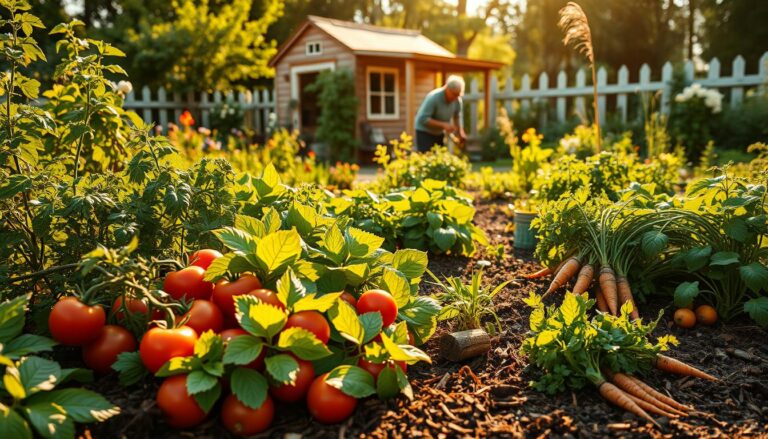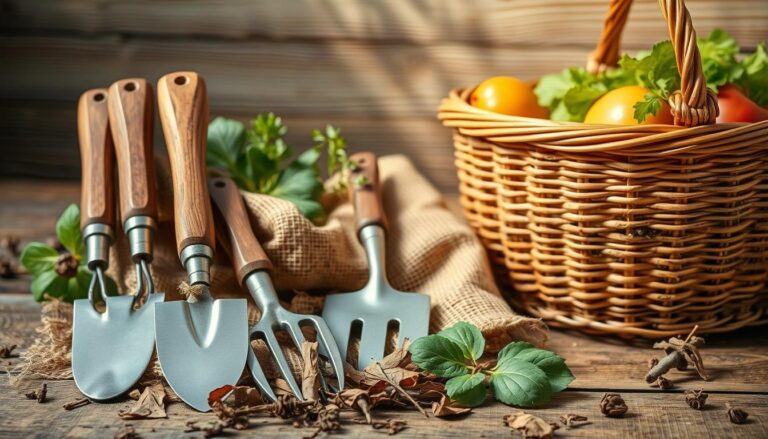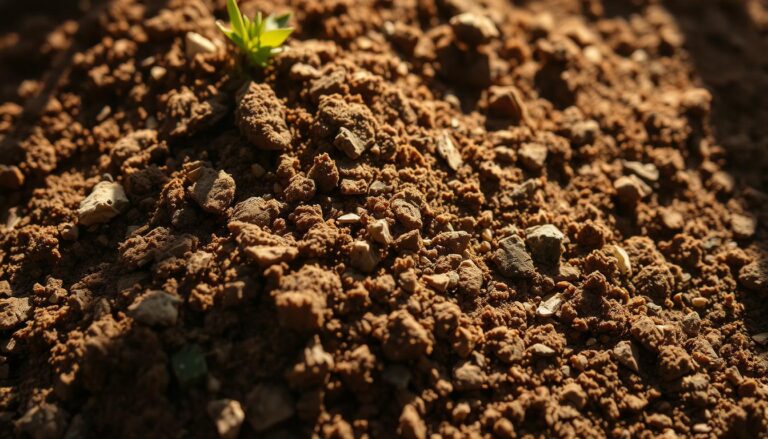Creating a organic garden takes hard work and the right methods. Using compost is a key way to make your garden better. It adds important nutrients, makes the soil better, and helps good microbes grow.
Adding compost to your garden makes it more sustainable and healthy. It’s good for your plants and the planet. Let’s look at how composting can turn your garden into a beautiful, green space.
Understanding Compost: Nature’s Perfect Soil Amendment
To truly appreciate compost, you need to know what it is and how it’s made. Compost is a rich, natural soil amendment. It’s made from the breakdown of organic materials like food scraps, leaves, and grass clippings.
What Is Compost and How Is It Created?
Compost is made when microorganisms like bacteria and fungi break down organic matter. This turns it into a nutrient-rich substance. To make compost, you need to collect organic materials, keep them moist, and ensure they get enough air.
The Science Behind Decomposition
The decomposition process is driven by microorganisms that eat organic matter. They break it down into simpler compounds. The rate of decomposition depends on temperature, moisture, and oxygen levels. Optimal conditions help make high-quality compost faster.
Key Components of Quality Compost
Quality compost has several key components:
- Nutrient-rich content: Compost is full of essential nutrients for plants.
- Beneficial microorganisms: Compost is full of microbes that help plants stay healthy.
- Good texture: Compost should be dark and crumbly, showing it’s full of humus.
By understanding these aspects of compost, gardeners can use it to improve their organic gardening.
The Advantages of Using Compost in Organic Gardening
Compost is key in organic gardening, offering many benefits. It helps create a sustainable, productive, and healthy garden. Gardeners can make their gardens better with compost.
Overview of Compost Benefits
Compost has many benefits, like improving soil structure and making nutrients available for plants. It adds organic matter to the soil. This makes the soil hold water better, breathe easier, and be more fertile.
This supports healthy roots and encourages plants to grow strong.
Why Organic Gardeners Rely on Compost
Organic gardeners choose compost because it’s natural and doesn’t use chemicals. It makes soil fertile and keeps plants healthy. Unlike synthetic fertilizers, compost gives nutrients slowly, which is better for plants.
This slow release prevents over-fertilization and keeps nutrients balanced.
Compost vs. Chemical Fertilizers
Compost and chemical fertilizers are different. Compost is natural and good for the soil in the long run. Chemical fertilizers might work fast but can harm the soil and the environment.
Compost helps gardeners grow sustainably by reducing the need for synthetic products.
Short-Term and Long-Term Garden Improvements
In the short term, compost makes soil better and plants healthier. Over time, regular compost use makes soil more fertile, reduces erosion, and supports more life. A good compost program is essential for organic gardening.
Using compost has many benefits, including:
- More soil organic matter
- Better soil structure and fertility
- More nutrient cycling and availability
- Support for beneficial soil microorganisms
- Less need for synthetic fertilizers and pesticides
Soil Structure Improvement: Building a Strong Foundation
A well-structured soil is crucial for a successful organic garden. Compost is the key to achieving this. It makes the soil healthier and more fertile, leading to stronger plant growth.
Transforming Clay Soils with Compost
Clay soils are dense and often waterlogged. Compost can greatly improve them. Compost breaks up clay particles, enhancing drainage and aeration. This supports healthier root growth.
Benefits for Sandy Soils
Sandy soils benefit from compost’s ability to hold water. Compost acts like a sponge, keeping moisture in. This reduces the need for frequent watering.
Creating the Ideal Soil Texture
The perfect soil texture balances drainage and water retention. This allows roots to grow well while keeping the soil moist. Compost is key in achieving this balance by modifying the soil’s physical structure.
Preventing Soil Compaction
Soil compaction harms plant health by restricting root growth and reducing aeration. Adding compost prevents soil compaction. It improves soil structure and increases porosity, creating a better environment for roots.
Nutrient Powerhouse: Feeding Your Plants Naturally
Adding compost to your garden does more than just add nutrients. It creates a rich ecosystem for your plants. Compost acts as a complete fertilizer, giving plants the nutrients they need to grow.
Essential Macronutrients in Compost
Compost is packed with macronutrients like nitrogen, phosphorus, and potassium. These are key for plant growth, root development, and health. The slow breakdown of compost means nutrients are released steadily, benefiting plants over time.
Micronutrient Benefits for Plant Health
Compost also has micronutrients like iron, zinc, and boron. These micronutrients are crucial for plant health, affecting photosynthesis and disease resistance. The variety of micronutrients in compost helps prevent deficiencies, ensuring plants grow well.
Slow-Release Nutrition for Long-Term Growth
One big advantage of compost in garden soil is its slow-release nutrition. Unlike quick-acting synthetic fertilizers, compost provides nutrients gradually. This supports long-term plant health and growth.
Balancing Soil pH Naturally
Compost also helps balance soil pH. It can adjust acidic or alkaline soils, making them better for plant roots. By stabilizing soil pH, compost reduces the need for extra amendments, saving gardeners money and effort.
Compost offers many benefits, making it essential for organic gardeners. By using compost, gardeners can create a sustainable, productive, and healthy garden ecosystem.
Biological Benefits: Creating a Living Soil Ecosystem
Compost is key to organic gardening. It adds nutrients and creates a living ecosystem. This ecosystem supports plant health and makes plants more resilient.
Beneficial Microorganisms in Compost
Compost is full of good microbes like bacteria, fungi, and protozoa. These microbes help break down organic matter. They make nutrients available to plants and fight off plant pathogens.
Earthworms and Other Soil Fauna
Earthworms are great for gardeners, and compost helps them thrive. As they move through the soil, they aerate it and improve its structure. They also help cycle nutrients. Other creatures like insects and nematodes also help keep the soil healthy.
Building Natural Disease Resistance
Soil with lots of beneficial microbes and organic matter helps plants fight off diseases naturally. This means you need less chemical pesticides. Your garden becomes a healthier place.
Suppressing Harmful Pathogens
A diverse microbial community in compost can keep harmful pathogens at bay. They do this by competing for resources and making antibiotics.
| Biological Component | Function | Benefit to Plants |
|---|---|---|
| Beneficial Microorganisms | Decompose organic matter, fight pathogens | Nutrient availability, disease resistance |
| Earthworms | Aerate soil, improve structure | Better root growth, water infiltration |
| Diverse Microbial Community | Suppress harmful pathogens | Reduced disease incidence |
Water Management: Improving Retention and Drainage
Adding compost to your garden can greatly improve soil’s water retention and drainage. This is key for a healthy garden, as it helps plants grow well and stay strong against weather changes.
Increasing Water-Holding Capacity
Compost works like a sponge, helping soil hold more water. This means you water less often and avoid soil erosion. The compost also makes soil better at holding water, thanks to its organic matter.
Reducing Irrigation Needs
Gardens with compost need less water to stay healthy. This saves water and cuts down on watering work. It also helps lower your water bill and supports water conservation.
Preventing Erosion and Runoff
Compost makes soil better at holding onto rainwater, stopping erosion and runoff. This keeps the soil in place and helps recharge groundwater.
Drought Resistance in Compost-Rich Gardens
Gardens with lots of compost are more drought-resistant. They hold onto moisture longer, lessening drought effects and helping plants grow better in dry times.
In summary, using compost in your garden is a simple way to manage water better. It helps keep water in the soil, cuts down on watering, stops erosion, and makes plants more drought-tolerant. Compost makes gardens more sustainable and resilient.
Environmental Advantages of Compost in Sustainable Gardening
Compost is key for eco-friendly gardeners. It helps reduce waste and makes gardens healthier and more productive.
Reducing Landfill Waste
Composting cuts down landfill waste. It turns organic waste into compost, full of nutrients. This lowers landfill volume and methane emissions.
Carbon Sequestration Benefits
Compost helps fight climate change. It makes soil better at holding carbon. This reduces carbon dioxide in the air.
Creating a Closed-Loop System in Your Garden
Composting turns waste into garden food. It cuts down on synthetic fertilizers. This makes gardening more sustainable.
Reducing Chemical Inputs and Runoff
Compost cuts down on chemical use. It offers natural nutrients, reducing chemical runoff. This protects water and ecosystems.
Composting helps gardeners support the environment. It makes gardens better and keeps ecosystems healthy.
Different Types of Compost and Their Specific Benefits
Compost comes in many types, each suited for different gardening needs. It’s a key part of organic gardening. It helps improve soil, adds nutrients, and supports plant health.
Traditional Compost Pile Benefits
Traditional compost piles are a favorite among gardeners. They use kitchen scraps, leaves, and grass clippings. This method is cheap and turns waste into something useful. The compost is full of nutrients and makes soil better.
Vermicompost: Worm Casting Advantages
Vermicompost, or worm compost, is made by worms breaking down organic matter. It’s packed with nutrients and microbes. It makes soil better, holds water, and feeds plants.
Compost Tea and Its Applications
Compost tea is made by soaking compost in water. It’s used to spray plants or soak the soil. It boosts plant health, fights diseases, and keeps the ecosystem balanced.
Specialized Composts for Specific Plants
Some plants need special composts. For example, orchids and cacti need specific mixes. These mixes give the right nutrients and moisture.
Store-Bought vs. Homemade Compost
Stores sell many compost products. But making compost at home is also good. Homemade compost lets you control what goes in. Store-bought compost is easy and consistent.
| Type of Compost | Benefits | Best For |
|---|---|---|
| Traditional Compost | Rich in nutrients, improves soil fertility | General gardening, vegetable gardens |
| Vermicompost | High in beneficial microbes, improves soil aeration | Seedlings, potted plants, soil conditioning |
| Compost Tea | Provides beneficial microbes, boosts disease resistance | Foliar sprays, soil drenches, plant health |
| Specialized Composts | Cater to specific plant needs, unique nutrient profiles | Orchids, cacti, and other specialty plants |
Practical Application: How to Use Compost Effectively
To get the most out of compost in your garden, you need a smart plan. Knowing the best ways to use compost can really improve your soil and help plants grow well.
Optimal Application Rates for Different Gardens
The right amount of compost depends on your garden. For veggie gardens, use 2- to 3-inches of compost. For flower beds, a thinner layer might be enough. Always check your soil first to know how much to use.
Best Timing for Compost Application
When to use compost matters a lot. Using it in the fall lets it break down over winter, making soil better for spring. Spring is also good, especially for new plants.
Incorporation Methods for Maximum Benefits
To get compost’s full benefits, mix it well into the soil. Aim for the top 6-8 inches. For plants already growing, a thin layer on top can help too.
Compost as Mulch vs. Soil Amendment
Compost works as both mulch and soil enhancer. Mulch keeps moisture in and weeds out. Soil enhancer makes soil better for plants. What you choose depends on your garden’s needs.
Seasonal Considerations for Compost Use
Seasons change how you use compost. In dry times, mulch it to keep soil wet. A gardening expert says, “Compost is key for organic gardening, boosting soil and plant health.”
“Compost is a cornerstone of organic gardening, offering numerous benefits that enhance soil health and plant vitality.”
Think about these points and use compost wisely. This way, you can make your garden a lush, green space that’s good for the planet.
Overcoming Common Challenges in Composting
Composting can face several challenges, but it’s worth it for gardening. Compost improves soil, adds nutrients, and boosts biological activity. It’s a key resource for organic gardening.
Troubleshooting Compost Problems
Composters often face issues like bad smells, pests, or incomplete breakdown. To solve these, keep the right mix of “green” and “brown” materials. Make sure it’s moist and turn the pile often.
Avoiding Nutrient Imbalances
Managing the compost pile is crucial to avoid nutrient imbalances. Too much nitrogen from green materials or too much carbon from brown materials can happen. A balanced mix is essential for nutrient-rich compost.
Managing the Composting Process in Different Climates
Climate affects composting. In hot weather, piles dry out fast and need more water. In cold weather, decomposition slows, and insulation helps keep microbes active. Knowing these climate challenges helps adjust composting strategies.
Dealing with Limited Space for Composting
Composting doesn’t need a big yard. Use compost bins or vermicomposting (worm composting) for small spaces. These methods are space-friendly and efficient.
Addressing Odor and Pest Concerns
Odors and pests are common composting issues. To reduce odors, balance and turn the pile regularly. Avoid adding meat, dairy, or oily foods to keep pests away. These steps help keep composting effective and neighbor-friendly.
| Challenge | Solution |
|---|---|
| Odors | Balance green and brown materials, turn regularly |
| Pests | Avoid adding meat, dairy, or oily foods |
| Nutrient Imbalances | Maintain a balanced mix of materials |
Conclusion: Embracing the Full Potential of Compost in Your Organic Garden
Incorporating compost into your organic garden can change it for the better. It boosts your garden’s health and makes it more productive. By using compost, you help your plants grow strong and healthy.
Compost offers many benefits for organic gardening. It makes the soil better and adds nutrients. It also helps good microorganisms and cuts down on waste. Using compost makes your garden better and helps the planet too.
Compost is key to a healthy garden and a healthy planet. Start composting today. See how your garden will grow and thrive with this natural and effective method.
FAQ
What are the main benefits of using compost in organic gardening?
How does compost improve soil structure in organic gardening?
What is the difference between using compost and chemical fertilizers in gardening?
Can compost help with water management in gardens?
What types of compost are available for gardening, and how do they differ?
How do I apply compost effectively in my garden?
What are some common challenges in composting, and how can they be overcome?
Is homemade compost as effective as store-bought compost?
How does compost contribute to a sustainable gardening practice?

Sortemdia nasceu com o propósito de trazer alegria e oportunidades para todos por meio de sorteios gratuitos de prêmios incríveis. O site tem como missão oferecer experiências acessíveis, divertidas e justas para quem deseja concorrer a produtos, serviços e brindes sem pagar nada por isso. Acreditamos que a sorte pode bater à porta de qualquer pessoa — e no Sortemdia, ela pode chegar com apenas um clique.



